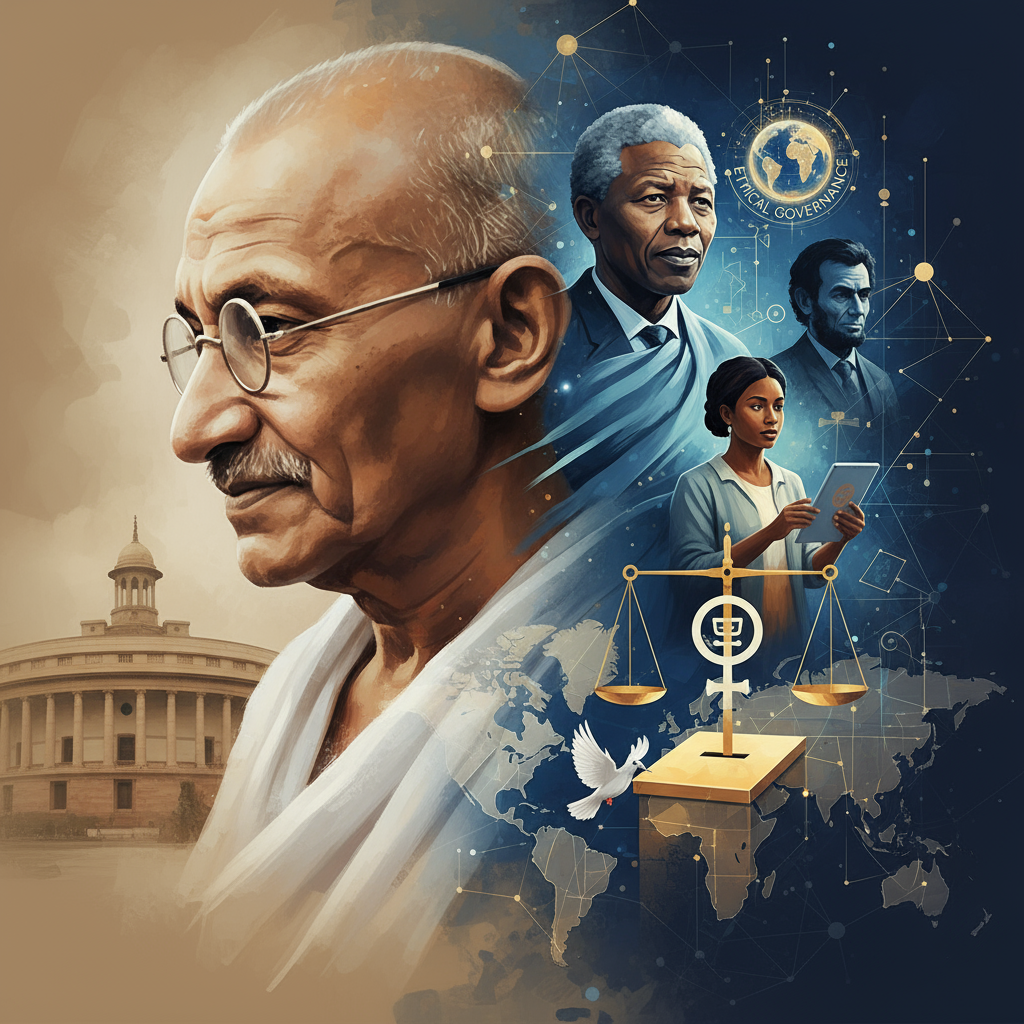Key Highlights
- Swaraj as self-governance at individual, community, and national levels
- Sarvodaya for welfare of all, prioritizing the poorest and marginalized
- Trusteeship ethos, ensuring ethical stewardship of resources and power
- Ahimsa and Satya as foundations for non-violent dialogue and accountability
- Decentralization via Panchayati Raj, empowering grassroots democracy
Mahatma Gandhi remains a global icon whose legacy extends beyond India’s independence struggle into enduring lessons for socio-economic justice and ethical governance. In today’s world of political polarization, corruption, and environmental crises, Gandhian principles offer a holistic framework to address modern governance challenges by embedding morality, participation, and sustainability at the core of public policy.
Core Principles of Gandhi’s Governance Philosophy
Swaraj (Self-rule)
Gandhi’s concept of Swaraj transcended mere political autonomy to encompass self-governance at all levels. It champions individual moral responsibility, community solidarity, and reduced dependency on centralized authority—principles vital for fostering active citizen engagement and resilient local governance.
Sarvodaya (Welfare of All)
Sarvodaya demands policies that uplift the poorest and most marginalized. It underpins inclusive social welfare schemes and equitable resource distribution, ensuring that development benefits reach every section of society.
Trusteeship
Gandhi’s trusteeship model advocates that individuals and institutions act as custodians of resources, prioritizing public good over personal gain. Embedding this ethos in governance strengthens ethical leadership and provides a robust bulwark against corruption.
Non-violence (Ahimsa) and Truth (Satya)
Ahimsa and Satya form the bedrock of non-violent conflict resolution and transparent governance. They encourage dialogue over confrontation, truthfulness over deception, and accountability over opacity.
Decentralization and Panchayati Raj
Believing in village republics, Gandhi championed Panchayati Raj—a system of local self-government that empowers communities, enhances service delivery, and fosters participatory democracy.
Relevance to Contemporary Governance Problems
Combating Corruption
Trusteeship and personal moral rectitude provide an ethical foundation to combat graft. Ethics training for public servants, inspired by Gandhi, can cultivate integrity and restore public trust.
Empowering Citizens
Lessons from Panchayati Raj highlight the importance of decentralizing decision-making. Strengthening local bodies improves governance responsiveness and ensures policies align with grassroots needs.
Promoting Social Equity
Sarvodaya’s focus on the poorest urges targeted welfare programs and social justice measures, addressing poverty, caste discrimination, and gender inequality.
Ensuring Sustainability
Gandhi’s simple living mantra aligns with sustainable development. Emphasizing resource efficiency, environmental stewardship, and low-impact lifestyles resonates with climate resilience strategies.
Resolving Conflicts
Non-violent communication and mediation, rooted in Ahimsa, provide frameworks for de-escalating communal tensions and fostering social harmony.
Applications in Contemporary Governance Models
- NGOs and Grassroots Movements: SEWA’s self-help cooperatives demonstrate Sarvodaya in action.
- Government Schemes: MGNREGA operationalizes decentralization and livelihood security.
- Cooperative Movement: Amul exemplifies trusteeship and community ownership.
- E-Governance: Digital transparency platforms reflect Satya and accountability.
Challenges in Applying Gandhian Governance Today
- Scale and Complexity: Adapting village-centric models for national bureaucracies demands structural innovation.
- Balancing Idealism and Realpolitik: Reconciling moral principles with political pragmatism requires contextual adaptation.
- Technological Governance: Ensuring digital tools uphold Gandhian ethics—privacy, equity, and transparency.
- Awareness and Capacity: Widespread training and citizen education are essential for effective implementation.
Way Forward and Recommendations
- Ethical Leadership Training
Integrate Gandhian values into civil service programs and public administration curricula. - Strengthening Local Institutions
Enhance Panchayat capacities, provide autonomy, and ensure financial devolution. - Policy Mainstreaming
Embed sustainability, equity, and non-violence in policy frameworks across sectors. - Civic Education Campaigns
Promote Gandhian participatory governance through school curricula and public outreach.
Conclusion
Mahatma Gandhi’s governance philosophy—rooted in self-rule, welfare for all, ethical stewardship, non-violence, and decentralization—offers a timeless blueprint for building accountable, inclusive, and sustainable institutions. By operationalizing these principles through training, policy reforms, and community engagement, India can address contemporary governance challenges and emerge as a model for ethical democracy worldwide.









+ There are no comments
Add yours